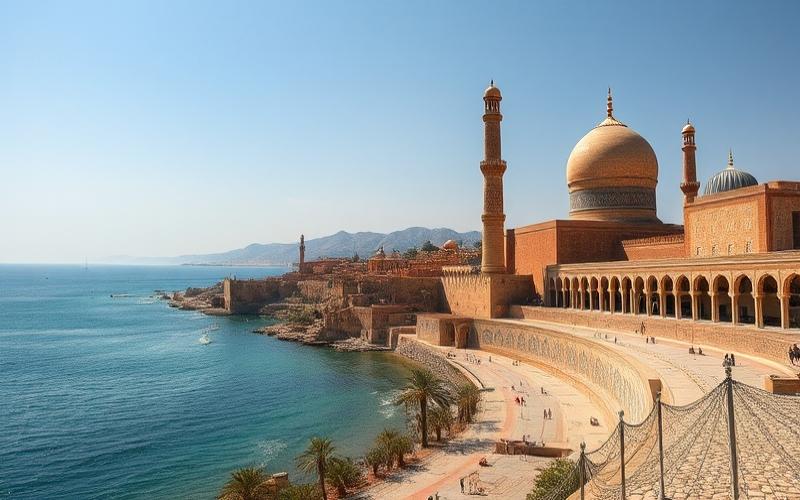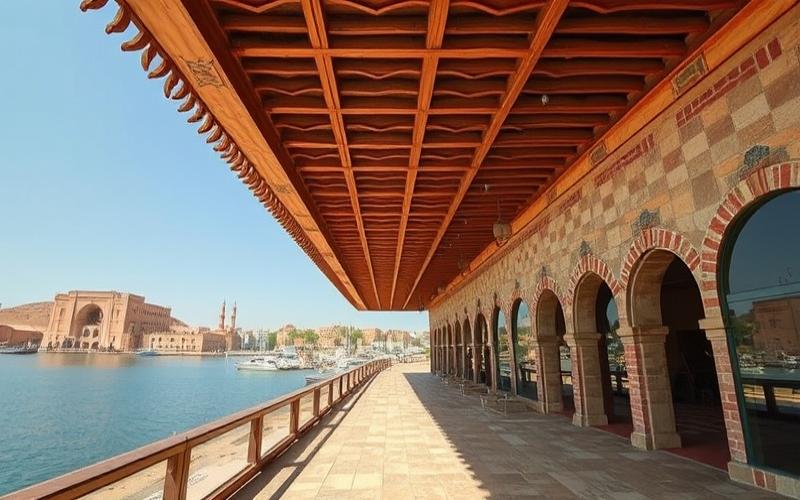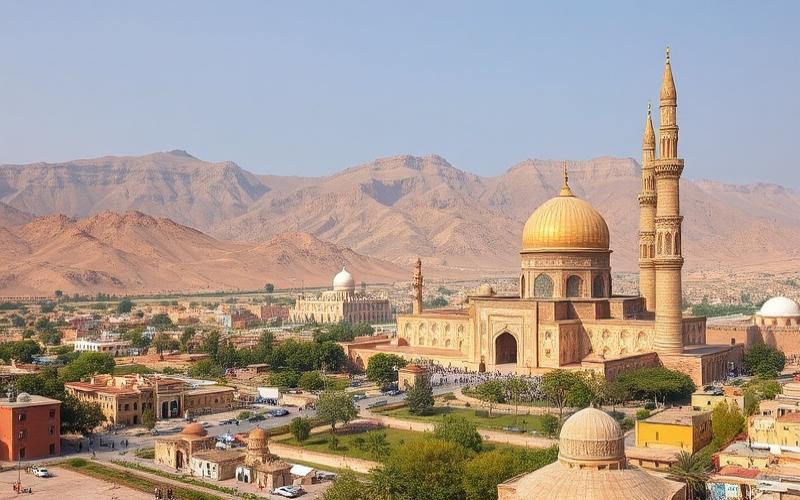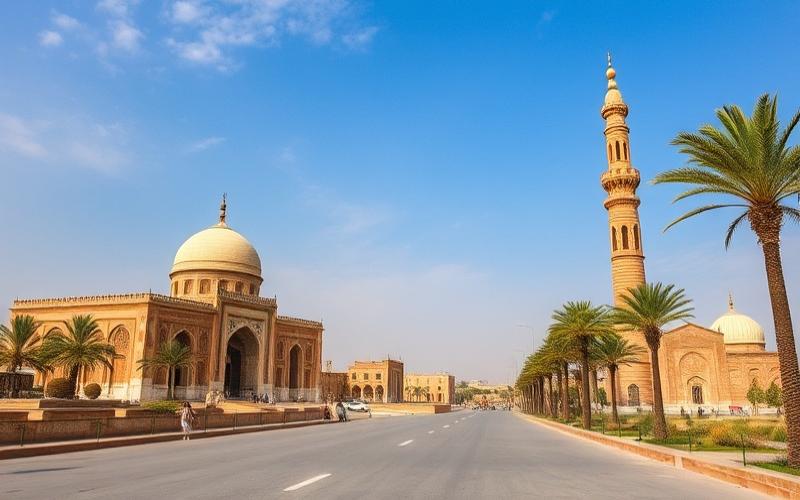
 Published on and written by Cyril Jarnias
Published on and written by Cyril Jarnias
Moving to Bahrain is an exciting adventure, but to fully enjoy it, immersing yourself in the local culture through learning Bahraini Arabic is essential. Mastering the local language not only facilitates daily communication but also enriches the integration experience by enabling deeper connections with residents. This article explores innovative methods and specific resources for expatriates eager to embark on this linguistic journey, with practical tools and tips to make the most of their stay in Bahrain.
Understanding the Importance of the Local Language in Bahrain
The impact of the local language on the social and professional integration of expatriates in Bahrain is crucial. Proficiency in Arabic is a real asset for facilitating professional relationships, building trust with local colleagues, and integrating more harmoniously into the community.
Direct Benefits of Mastering Arabic:
- Improved Professional Relationships: Speaking Arabic promotes communication with local collaborators, clients, and partners, especially in sectors where negotiation and trust are essential.
- Accelerated Social Integration: Understanding and using Arabic allows for building closer ties with neighbors, participating in community life, and being perceived as respectful of the local culture.
- Access to the Local Job Market: Some management or administrative positions require knowledge of Arabic, opening up new professional opportunities.
Table: Impact of Arabic Proficiency in Bahrain
| Area | Effect of Arabic Proficiency |
|---|---|
| Professional Relationships | Direct communication, increased trust, access to specific positions |
| Social Integration | Participation in local events, friendships with Bahrainis, sense of belonging |
| Daily Life | Easier handling of administrative procedures, understanding of public announcements and information |
| Cultural Life | Authentic access to traditions, festivals, and customs |
Cultural Importance of the Arabic Language:
- Language of Traditions and Customs: Arabic is at the heart of religious rituals, national celebrations, and family life. Idiomatic expressions, proverbs, and poetry are omnipresent and reflect the kingdom’s history.
- Transmission of Values: The language serves as a vehicle for educating younger generations and perpetuating values of respect, hospitality, and solidarity, which are fundamental in Bahraini society.
- National Identity: Proficiency in Arabic is seen as a sign of respect and integration into society, strengthening the sense of unity.
Challenges Faced by Expatriates When Learning Arabic:
- Linguistic Complexity: Arabic, with its specific alphabet and grammatical structures, can seem difficult for beginners.
- Differences Between Standard Arabic and Bahraini Dialect: Daily usage favors the local dialect, which differs from the literary Arabic taught in schools or courses for foreigners.
- Lack of Time or Opportunities: Intense professional life and the strong presence of English-speaking international communities can limit the immediate need to learn Arabic.
Long-Term Benefits of Learning Arabic:
- Deep Understanding of Society: Access to local media, literature, and popular culture.
- Personal Enrichment: Development of intercultural sensitivity, ability to navigate other Arabic-speaking countries.
- Enhanced Job Market Value: Sought-after language skill in many international sectors.
- Authentic Human Relationships: Building trust and lasting friendships with Bahrainis.
Key Takeaway:
Investing in learning Arabic in Bahrain is not just a practical step; it’s also a gateway to the richness of Bahraini traditions, values, and hospitality.
Good to Know:
Mastering Arabic in Bahrain not only facilitates professional exchanges but also strengthens community ties, opening you to a world rich in traditions and values. Despite the learning challenges, this skill offers invaluable cultural enrichment and better long-term integration.
Learning Methods for Expatriates in Bahrain
Expatriates in Bahrain have several learning methods to master Arabic, tailored to their needs and pace.
- Formal Language Courses
- Local institutions and specialized schools offer courses in classical, modern standard, or dialectal Arabic.
- Courses can be private or in small groups, with bilingual teachers facilitating learning through explanations in the student’s native language.
- Option to take courses online (Zoom, Skype) with a flexible schedule.
- Adapted curricula are available: general Arabic, business Arabic, preparation for language exams.
- Language Exchanges with Native Speakers
- Informal meetings organized between expatriates and Arabic-speaking residents to practice everyday conversation.
- Discussions around local cultural or historical themes promote natural language immersion.
- Apps and Online Platforms
- Use of apps like Duolingo, Babbel, or Memrise that offer modules dedicated to modern standard Arabic or regional Gulf dialects.
- Interactive platforms allowing oral practice with native tutors via video conferencing.
- Expatriate Communities and Social Groups
- International clubs and local associations regularly organize:
- Themed discussion sessions
- Cultural workshops (Arabic calligraphy, traditional cuisine)
- Group outings to discover Bahraini historical sites while practicing the language
- International clubs and local associations regularly organize:
Comparative Table of Main Methods
| Method | Main Advantages | Key Points |
|---|---|---|
| Formal Courses | Solid pedagogical structure | Certified progression |
| Language Exchanges | Real & spontaneous practice | Social immersion |
| Apps / Platforms | Flexibility & adaptation to pace | Immediate access |
| Communities / Groups | Friendly & cultural approach | Networking |
Success Stories
Several expatriates report reaching an advanced level (B2/C1) after six months to a year by combining regular classes twice a week with active practice at social events. Integration into local activities significantly accelerates oral comprehension of the Bahraini dialect.
Practical Tips to Optimize Learning:
- Alternate academic learning (grammar/vocabulary) with daily cultural immersion
- Actively participate in cultural events to associate words/expressions with real context
- Immerse yourself in local history: visiting museums/historical sites helps acquire specific vocabulary while discovering heritage
- Vary educational materials: educational videos about Bahrain, local Arabic-speaking podcasts
- Set specific goals each week (e.g., hold a simple conversation on a cultural topic)
Key Tip:
Systematically incorporate a Bahraini cultural element into each session—whether a local proverb or historical fact—not only aids memorization but also enhances the joy of learning.
Good to Know:
Expatriates in Bahrain favor formal language courses and use online platforms like Mondly or Rosetta Stone; joining communities like InterNations also allows practice at cultural events. Incorporating Bahraini cultural elements, such as the history of pearls, can enrich Arabic learning.
Recommended Resources for Self-Study
For self-study of the local language in Bahrain, several varied and complementary resources can be utilized according to your needs and preferences:
Online Platforms for Learning Arabic
- Duolingo
- Babbel
- Rosetta Stone
These platforms offer interactive courses focused on modern standard Arabic, suitable for beginners looking to acquire basics in vocabulary, grammar, and oral comprehension.
Language Exchange Apps and Live Conversation
- Tandem
- HelloTalk
Allow contact with native speakers to practice Bahraini Arabic via instant messaging or voice calls. They offer real immersion in the local dialect through spontaneous exchanges.
YouTube Channels and Podcasts Specializing in Bahraini Dialect
| Resource | Type | Main Focus |
|---|---|---|
| Bahraini Arabic | YouTube | Common Expressions |
| Learn Gulf Arabic | Podcast | Gulf Dialects |
Look for creators who specifically address local dialectal variants to improve your understanding of everyday speech.
Books and Manuals Adapted for Beginners
- “Arabic for Beginners” (available in some local bookstores)
- Specialized manuals on the Gulf dialect
- Illustrated guides to facilitate visual memorization
Some works are available online or at bookstores in Bahrain; prioritize those that include practical exercises on local common vocabulary.
Local Resources: Evening Classes & Meetup Groups
Non-exhaustive list:
- Courses offered by ACE Education Bahrain (personalized tutoring, individual or group sessions)
- Tobian Language School (small group or private lessons with experienced teachers)
- Kalimah Center (intensive courses for children/adults)
Informal groups also regularly meet in cultural centers, cafes, or expatriate associations to encourage relaxed social practice.
Local Media: Daily Auditory Immersion
Recommended list:
- Popular TV shows
- National radio stations broadcasting news and debates
- Drama series highlighting the Bahraini dialect
Regular listening promotes passive acquisition of idiomatic expressions specific to the local cultural context.
Cultural Events as an Additional Immersive Method
Participate in:
- Traditional festivals
- Artistic workshops
- Association meetings
These opportunities not only allow active language practice but also enrich cultural knowledge while building connections with locals.
Good to Know:
Use platforms like Duolingo or Rosetta Stone for online Arabic courses, and practice Bahraini Arabic with native speakers via Tandem. Participate in evening classes or meetup groups in Bahrain for a more immersive learning experience and add podcasts or YouTube channels focused on the local dialect to your study routine.
Basic Vocabulary and Useful Phrases in Bahrain
Learning a few local words and expressions is an essential asset for integrating into Bahrain, facilitating daily exchanges, and showing respect for the local culture. While Arabic is the country’s official language, English remains ubiquitous in professional and tourist settings, which often simplifies interactions with expatriates or visitors.
Here is a selection of useful vocabulary and expressions in Bahraini Arabic:
| English | Arabic (Transliteration) | Arabic (Script) |
|---|---|---|
| Hello | Marhaba / Ahlan | أهلاً |
| Thank you | Shukran | شكراً |
| Please | Min fadlik | من فضلك |
| Yes | Na’am | نعم |
| No | La | لا |
| How much does this cost? | Bikam hādhā ? | بكم هذا؟ |
Useful Phrases for Typical Situations:
Asking for Directions
- Where is…? : Ayna…? (أين…؟)
- Can you help me? : Hal yumkinuka musa’adati? (هل يمكنك مساعدتي؟)
Ordering Food
- I would like… : Uridu… (أريد…)
- Without spices, please : Bidūn baharat, min fadlik. (بدون بهارات، من فضلك.)
Expressing Needs
- I need help : Ana ahtaj ila musa’ada. (أنا أحتاج إلى مساعدة.)
- Where is the restroom? : Ayna al-hammam? (أين الحمام؟)
Pronunciation Tips:
- Arabic is written from right to left.
- Some letters don’t exist in English; listening to natives helps grasp their sounds.
- Short vowels are often lightly marked in speech.
- Consonants like aspirated “h” or “ayn” (‘) can be difficult at first.
To Deepen Your Learning:
- Use mobile apps such as Duolingo, Memrise, or Mondly Arabic.
- Explore specialized platforms like Gulf Arabic, which offers local vocabulary adapted to the Persian Gulf.
- Take online courses on Busuu, Babbel, or via YouTube to directly hear Gulf Arabic speech.
Taking the time to learn these basics will greatly facilitate your daily life and enrich your human experiences in Bahrain.
Good to Know:
Learning a few Arabic expressions like “Hello” (أهلاً) and “Thank you” (شكراً) facilitates integration; apps like Duolingo or Babbel can help deepen your local vocabulary.
Disclaimer: The information provided on this website is for informational purposes only and does not constitute financial, legal, or professional advice. We encourage you to consult qualified experts before making any investment, real estate, or expatriation decisions. Although we strive to maintain up-to-date and accurate information, we do not guarantee the completeness, accuracy, or timeliness of the proposed content. As investment and expatriation involve risks, we disclaim any liability for potential losses or damages arising from the use of this site. Your use of this site confirms your acceptance of these terms and your understanding of the associated risks.





























































